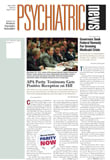If additional evidence were needed of the divergent opinions among our members regarding relationships with pharmaceutical companies—as well as the passions evoked by the topic—these letters offer conclusive proof. Should we as a profession refuse to have anything to do with the drug companies or is our greatest failing as a profession that we are neglecting to squeeze as much money from them as we can? Are the brightly colored trinkets dispensed by the pharmaceutical detailers appropriate tokens of love for our offspring or dangerous lures that threaten our independence and devotion to our patients’ needs? Write your prescriptions and make your choice.
Amid this welter of conflicting individual opinions, APA must define a reasonable policy for a professional organization. That task is complicated by the recognition—at least insofar as our annual meeting is concerned—that our failure to provide space within the meeting for pharmaceutical displays on the exhibit floor and industry-supported symposia in the program will simply mean that these activities will take place nearby in competition with our meeting and in ways over which we have no control. Whatever the virtues of ideological purity, and it has its place, the compromise that brings these activities within the meeting and subjects them to guidelines and appropriate oversight (as described in my July 5 column) seems to me to be a reasonable one.
How about our other relationships with the industry? APA accepts industry support for educational programs such as fellowships for residents, newsletters for our members, and other special projects. As long as those donations come with no strings other than a discreet acknowledgment—which they do—I see no problem with them. Pharmaceutical companies and others advertise in our journals and in this publication; in a world suffused with advertising, where SSRIs are marketed to the public on primetime TV, it seems difficult to identify the harm that permitting such advertising might cause. Just as members are free to avoid the pharmaceutical exhibits at the annual meeting, they are at liberty to page past the advertisements in our journals.
Could APA exist without any money coming into its coffers from the pharmaceutical industry? Of course it could: it would be a much smaller organization, and the tasks it could undertake would be much more limited.
But I have served as president of a psychiatric subspecialty organization that gets essentially no revenue from the pharmaceutical industry and manages its limited role very nicely indeed. The question is one of costs and benefits. What is to be gained from abandoning our carefully calibrated relationship with the drug companies, that is, in what way would we be a better organization by doing that? And are those gains greater than the losses we would suffer in becoming an organization without the means to engage in public information, advocacy, and educational activities? I think the burden is on those who would alter the status quo to explain to us clearly why that is worth doing.
Finally, I have been impressed over the years with the possibility of discussing even the most complex and charged topics in a tone of civility.
To my surprise, it has usually turned out that those who favored other approaches than those I would support were as well intentioned in their efforts as I imagined myself to be. This conclusion, along with the recognition that civil and even understated argument often exceeds in impact its more fervid counterpart, has usually led me to forgo the enormous pleasure associated with calumniating those who differ with me. Clearly, this is not a universally accepted proposition—but I offer it for whatever it may be worth.
